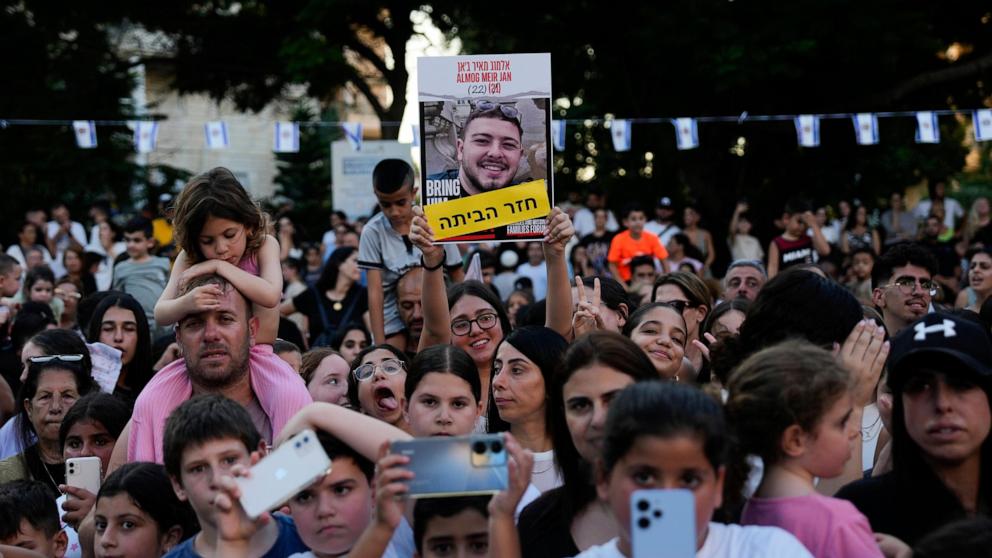Israeli protesters block highways and demand ceasefire to release hostages, nine months after Gaza war began

TEL AVIV, Israel – Nine months after the war in Gaza began, Israeli protesters blocked highways across the country on Sunday, demanding the resignation of Prime Minister Benjamin Netanyahu and urging a ceasefire to release scores of hostages held by Hamas.
The demonstrations come as long-running efforts for a ceasefire gained momentum last week when Hamas dropped a key demand for an Israeli pledge to end the war. The militant group still seeks a permanent ceasefire, while Netanyahu has vowed to fight on until Hamas is destroyed.
The war was sparked by Hamas’s cross-border attack on October 7, which killed 1,200 people and took 250 hostage. Israel’s retaliatory offensive has killed more than 38,000 Palestinians, according to the territory’s Health Ministry, although the count does not distinguish between fighters and civilians.
Israelis launch “Day of Disruption”
Sunday’s “day of unrest” began at 6:29 a.m., the same time Hamas fighters fired the first rockets into Israel in the first attack. Protesters blocked main roads and demonstrated in front of the homes of government ministers.
Near the border with the Gaza Strip, Israeli demonstrators released 1,500 black and yellow balloons to commemorate their killed and kidnapped fellow citizens.
Hannah Golan said she had come to protest against our government’s “devastating neglect of our communities.” She added: “It has been nine months since that dark day and still no one in our government is taking responsibility.”
About 120 hostages remain held after more than 100 were released under a ceasefire agreement in November. Israel has already concluded that more than 40 of the remaining hostages are dead, and there are fears that number will rise as the war continues.
The US has rallied the world behind a proposal for a gradual ceasefire in which Hamas would release remaining prisoners in return for a permanent ceasefire and the withdrawal of Israeli forces from Gaza. But Hamas wants guarantees from mediators that the war will end, while Israel wants the freedom to resume fighting if talks on the release of the last hostages drag on.
Netanyahu also said Israel remains determined to destroy Hamas’ military and political power and will resume the war after a pause to release the hostages.
Israel continues to battle enclaves of Palestinian militants throughout the Gaza Strip after heavy bombings and ground operations in recent months devastated the territory’s major cities and displaced most of its 2.3 million residents, often multiple times.
Bodies found with hands tied
Nasser Hospital in the southern Gaza city of Khan Younis said the bodies of three Palestinians were recovered from the area of the Kerem Shalom border crossing with Israel. A hospital statement said they were handcuffed and that an Associated Press reporter saw one of the bodies with her hands tied.
Abdel-Hadi Ghabaeen, the uncle of one of the dead, said they had been working to ensure the delivery of humanitarian aid and commercial goods through the border crossing. He said he saw soldiers arrest them on Saturday and the bodies showed signs of beatings, with one having a broken leg.
The Israeli military said it was investigating the reports.
Since the war began, thousands of Palestinians have been arrested. Many of those released, as well as some Israelis who have worked in detention centers, say the prisoners were tortured and held in harsh conditions. The Israeli authorities deny mistreating prisoners.
At least 13 Palestinians were killed in Israeli air strikes overnight and into Sunday, including the Secretary of State for Labor of the largely shattered Hamas government.
Ihab al-Ghussein was one of four people killed in an attack on a Gaza City school that was being converted into a temporary shelter, according to the Civil Defense, an aid group. Hamas mourned his loss in a statement, saying an attack earlier in the war destroyed his home and killed his wife and daughter.
The Israeli military said it had attacked a militant complex “near a school building” as well as a nearby Hamas weapons factory in Gaza City after taking measures to reduce harm to civilians.
Six people were killed in an attack on a house in the central town of Zawaida, according to the Al-Aqsa Martyrs’ Hospital. Another three people died in an attack on a house near Gaza City, according to the Civil Defense Agency, which is under the control of the Hamas government.
Israel exchanges fire with Hezbollah
The Lebanese militant group Hezbollah said early Sunday it fired dozens of missiles toward northern Israel, hitting areas more than 30 kilometers (19 miles) from the border, deeper than most launches. A 28-year-old man was seriously wounded, Israel’s national ambulance service reported. The shelling came after an Israeli airstrike killed a Hezbollah fighter on Saturday.
After the war in Gaza broke out, Hezbollah began launching rocket and mortar attacks. The scale and severity of the attacks, as well as Israeli counterattacks, have increased in recent weeks, raising fears of a full-scale war that would have catastrophic consequences for people on both sides of the border.
Mediators from the United States, Egypt and Qatar have stepped up efforts over the past week to reach an agreement between Israel and Hamas. Hezbollah has said it will stop its attacks if there is a ceasefire in Gaza.
Hamas’ compromise on Saturday could lead to the first pause in fighting since November and pave the way for further talks, although all sides still warned that an agreement was not yet guaranteed.
Washington’s phased agreement would begin with a “complete and comprehensive” six-week ceasefire, during which elderly, sick and female hostages would be released in exchange for hundreds of Palestinian prisoners. During those 42 days, Israeli forces would withdraw from densely populated areas of Gaza and allow displaced people to return to their homes in northern Gaza.
War-weary Palestinians in the Gaza Strip were pessimistic after previous instances had suggested that both sides were close to reaching an agreement.
“We have lived through nine months of suffering,” said Heba Radi, a mother of six who lives in a tent in the central town of Deir al-Balah, where she has sought refuge since fleeing her home in Gaza City. “The ceasefire has become a distant dream.”
___ Magdy reported from Cairo.
___
Follow AP’s war coverage at https://apnews.com/hub/israel-hamas-war



